The Differences Between a Break and a Sprain
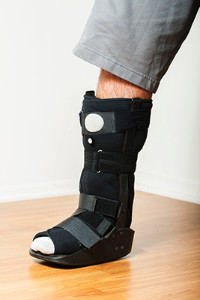 Research has shown the foot consists of 26 bones. If you have endured a fall resulting in severe pain in your foot, one of these bones may have been fractured, and this is often referred to as a broken foot. General symptoms of a sprain and a fracture typically include swelling and pain, so it’s advised to be able to differentiate between the two. This can be accomplished by comparing both feet and looking for breaks in the skin, which may result from a broken bone. Additional indications of a broken foot may be a feeling of dizziness, extreme discomfort, and pain while attempting to walk, or feeling a bone in the foot snap as the injury occurs. Temporary relief can be found in resting the foot by limiting attempts to walk, in addition to elevating the leg as soon as possible. A proper diagnosis will typically consist of performing an X-ray, which can determine the severity of the fracture. Please consult with a podiatrist for proper treatment options, which may include a walking boot or cast.
Research has shown the foot consists of 26 bones. If you have endured a fall resulting in severe pain in your foot, one of these bones may have been fractured, and this is often referred to as a broken foot. General symptoms of a sprain and a fracture typically include swelling and pain, so it’s advised to be able to differentiate between the two. This can be accomplished by comparing both feet and looking for breaks in the skin, which may result from a broken bone. Additional indications of a broken foot may be a feeling of dizziness, extreme discomfort, and pain while attempting to walk, or feeling a bone in the foot snap as the injury occurs. Temporary relief can be found in resting the foot by limiting attempts to walk, in addition to elevating the leg as soon as possible. A proper diagnosis will typically consist of performing an X-ray, which can determine the severity of the fracture. Please consult with a podiatrist for proper treatment options, which may include a walking boot or cast.
A broken foot requires immediate medical attention and treatment. If you need your feet checked, contact Dr. Joshua David Scoll from Pennsylvania. Our doctor can provide the care you need to keep you pain-free and on your feet.
Broken Foot Causes, Symptoms, and Treatment
A broken foot is caused by one of the bones in the foot typically breaking when bended, crushed, or stretched beyond its natural capabilities. Usually the location of the fracture indicates how the break occurred, whether it was through an object, fall, or any other type of injury.
Common Symptoms of Broken Feet:
- Bruising
- Pain
- Redness
- Swelling
- Blue in color
- Numbness
- Cold
- Misshapen
- Cuts
- Deformities
Those that suspect they have a broken foot shoot seek urgent medical attention where a medical professional could diagnose the severity.
Treatment for broken bones varies depending on the cause, severity and location. Some will require the use of splints, casts or crutches while others could even involve surgery to repair the broken bones. Personal care includes the use of ice and keeping the foot stabilized and elevated.
If you have any questions please feel free to contact one of our offices located in Philadelphia, Bensalem, and Fairless Hills, PA . We offer the newest diagnostic and treatment technologies for all your foot and ankle needs.
What are Orthotics?
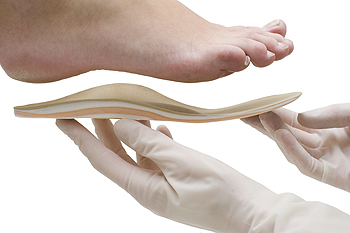 Corrective inserts that are designed to be used in shoes are often referred to as orthotics. There are several benefits to using orthotics, including providing comfort, stability, and additional support that the foot may need. They are typically used to correct certain foot abnormalities, including high arches, flat feet, or foot structures that may originate from a predisposed inherited gene. They are generally constructed of materials designed for the specific foot issue, which may be a high arch or specific heel injuries. If you have foot pain, there is a chance that orthotics may work for you. A podiatrist will be able to ascertain if orthotics are needed for your foot condition.
Corrective inserts that are designed to be used in shoes are often referred to as orthotics. There are several benefits to using orthotics, including providing comfort, stability, and additional support that the foot may need. They are typically used to correct certain foot abnormalities, including high arches, flat feet, or foot structures that may originate from a predisposed inherited gene. They are generally constructed of materials designed for the specific foot issue, which may be a high arch or specific heel injuries. If you have foot pain, there is a chance that orthotics may work for you. A podiatrist will be able to ascertain if orthotics are needed for your foot condition.
If you are having discomfort in your feet and would like to try orthotics, contact Dr. Joshua David Scoll from Pennsylvania. Our doctor can provide the care you need to keep you pain-free and on your feet.
What Are Orthotics?
Orthotics are inserts you can place into your shoes to help with a variety of foot problems such as flat feet or foot pain. Orthotics provide relief and comfort for minor foot and heel pain but can’t correct serious biomechanical problems in your feet.
Over-the-Counter Inserts
Orthotics come in a wide variety of over-the-counter inserts that are used to treat foot pain, heel pain, and minor problems. For example, arch supports can be inserted into your shoes to help correct overarched or flat feet, while gel insoles are often used because they provide comfort and relief from foot and heel pain by alleviating pressure.
Prescription Orthotics
If over-the-counter inserts don’t work for you or if you have a more severe foot concern, it is possible to have your podiatrist prescribe custom orthotics. These high-quality inserts are designed to treat problems such as abnormal motion, plantar fasciitis, and severe forms of heel pain. They can even be used to help patients suffering from diabetes by treating foot ulcers and painful calluses and are usually molded to your feet individually, which allows them to provide full support and comfort.
If you are experiencing minor to severe foot or heel pain, it’s recommended to speak with your podiatrist about the possibilities of using orthotics. A podiatrist can determine which type of orthotic is right for you and allow you to take the first steps towards being pain-free.
If you have any questions please contact one of our offices located in Philadelphia, Bensalem, and Fairless Hills, PA . We offer the newest diagnostic and treatment technologies for all your foot and ankle needs.
Tips for Wearing High Heels
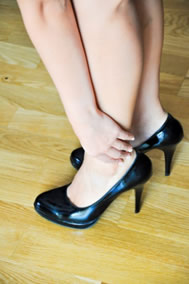 High heels are a pair of shoes nearly every woman has in her closet. Many women, however, overlook the quality and comfort of their high heels in favor of style. This can be detrimental for the feet in the long run. Women should consider the following seven key guidelines when choosing their next pair of heels: invest in quality materials, such as leather; look for shoes that are well-stitched and properly lined; take your heels to the cobbler if you need to ensure loose parts are fitted correctly; try on the shoe before purchasing; select a heel height that is comfortable for you; choose your heel thickness based on how heavy or light-footed you are; and invest in shoe sprays to prolong the life of your high heels.
High heels are a pair of shoes nearly every woman has in her closet. Many women, however, overlook the quality and comfort of their high heels in favor of style. This can be detrimental for the feet in the long run. Women should consider the following seven key guidelines when choosing their next pair of heels: invest in quality materials, such as leather; look for shoes that are well-stitched and properly lined; take your heels to the cobbler if you need to ensure loose parts are fitted correctly; try on the shoe before purchasing; select a heel height that is comfortable for you; choose your heel thickness based on how heavy or light-footed you are; and invest in shoe sprays to prolong the life of your high heels.
High heels have a history of causing foot and ankle problems. If you have any concerns about your feet or ankles, contact Dr. Joshua David Scoll of Pennsylvania. Our doctor can provide the care you need to keep your pain free and on your feet.
Effects of High Heels on the Feet
High heels are popular shoes among women because their style and societal appeal. Despite this, they can still cause many health problems if worn too frequently.
What parts my body will be affected by high heels?
- Ankle Joints
- Achilles Tendon – may shorten and stiffen with prolonged wear
- Balls of the Feet
- Knees – heels cause the knees to bend constantly, creating stress on them
- Back – they decrease the spine’s ability to absorb shock, which may lead to back pain. Also, the vertebrae of the lower back may compress.
What kinds of foot problems can develop from wearing high heels?
- Corns
- Calluses
- Hammertoe
- Bunions
- Morton’s Neuroma
- Plantar Fasciitis
How can I still wear high heels and maintain foot health?
If you want to wear high heeled shoes, make sure that you are not wearing them every day, as this will help prevent long term physical problems. Try wearing thicker heels as opposed to stilettos to distribute weight more evenly across the feet. Always make sure you are wearing the proper shoes for the right occasion, such as sneakers for exercising. If you walk to work, try carrying your heels with you and changing into them once you arrive at work. Adding inserts to your heels can help cushion your feet and absorb shock. Full foot inserts or metatarsal pads are available.
If you have any questions please feel free to contact our office located in Philadelphia and Bensalem, PA. We offer the newest diagnostic tools and technology to treat your foot and ankle needs.
Softening Corns and Calluses for Removal
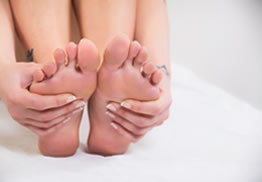 Among foot conditions, corns and calluses are often seen as some of the more harmless concerns. Regardless, if a corn or callus does become troublesome, there are methods available for removal. Because calluses are essentially small areas of thick, hardened skin, softening calluses can help aid in their removal. Soaking the feet in warm water and avoiding using harsh soaps while washing can help maintain softness of the skin. Hard areas can also be buffed away using a pumice stone. If you are suffering from corns and calluses and seek ways to remove them, consult with your podiatrist.
Among foot conditions, corns and calluses are often seen as some of the more harmless concerns. Regardless, if a corn or callus does become troublesome, there are methods available for removal. Because calluses are essentially small areas of thick, hardened skin, softening calluses can help aid in their removal. Soaking the feet in warm water and avoiding using harsh soaps while washing can help maintain softness of the skin. Hard areas can also be buffed away using a pumice stone. If you are suffering from corns and calluses and seek ways to remove them, consult with your podiatrist.
If you have any concerns regarding your feet and ankles, contact Dr. Joshua David Scoll of Pennsylvania. Our doctor can provide the care you need to keep you pain-free and on your feet.
Corns: What are they? And how do you get rid of them?
Corns can be described as areas of the skin that have thickened to the point of becoming painful or irritating. They are often layers and layers of the skin that have become dry and rough, and are normally smaller than calluses.
Ways to Prevent Corns
There are many ways to get rid of painful corns such as wearing:
- Well-fitting socks
- Comfortable shoes that are not tight around your foot
- Shoes that offer support
Treating Corns
Treatment of corns involves removing the dead skin that has built up in the specific area of the foot. Salicylic acid can help in getting rid of these corns because it dissolves keratin, which is the protein that makes up a good majority of corns. Podiatrists recommend that people with diabetes not use salicylic acid but should consult with their podiatrist regarding the treatment of corns.
If you have any questions please feel free to contact our office located in Philadelphia and Bensalem, PA. We offer the newest diagnostic and treatment technologies for all your foot and ankle needs.
About Plantar Fasciitis
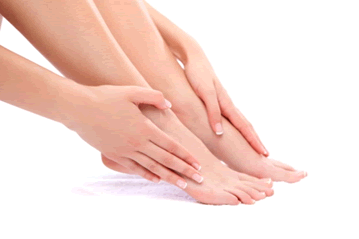 Plantar fasciitis is a foot condition that most commonly affects those between the ages of 30 to 55, especially those who are athletes. The plantar fascia, a ligament that runs beneath the sole of the foot, supports the arch of the foot and acts as a shock absorber. Repeated stress and impact to the heel, however, can cause the fascia to tear and cause inflammation. This results in the foot condition, plantar fasciitis. While there are various specific causes behind plantar fasciitis, excessive pressure is often the case. To determine the cause of your plantar fasciitis and the most appropriate treatment, consult with your podiatrist.
Plantar fasciitis is a foot condition that most commonly affects those between the ages of 30 to 55, especially those who are athletes. The plantar fascia, a ligament that runs beneath the sole of the foot, supports the arch of the foot and acts as a shock absorber. Repeated stress and impact to the heel, however, can cause the fascia to tear and cause inflammation. This results in the foot condition, plantar fasciitis. While there are various specific causes behind plantar fasciitis, excessive pressure is often the case. To determine the cause of your plantar fasciitis and the most appropriate treatment, consult with your podiatrist.
Plantar fasciitis can be very painful and inconvenient. If you are experiencing heel pain or symptoms of plantar fasciitis, contact Dr. Joshua David Scoll of Pennsylvania. Our doctor can provide the care you need to keep your pain free and on your feet.
What is Plantar Fasciitis?
Plantar fasciitis is the inflammation of the thick band of tissue that runs along the bottom of your foot, known as the plantar fascia, and causes mild to severe heel pain.
What Causes Plantar Fasciitis?
· Excessive running
· Non-supportive shoes
· Overpronation
· Repeated stretching and tearing of the plantar fascia
How Can It Be Treated?
· Conservative measures – anti-inflammatories, ice packs, stretching exercises, physical therapy, orthotic devices
· Shockwave therapy – sound waves are sent to the affected area to facilitate healing and are usually used for chronic cases of plantar fasciitis
· Surgery – usually only used as a last resort when all else fails. The plantar fascia can be surgically detached from the heel
While very treatable, plantar fasciitis is definitely not something that should be ignored. Especially in severe cases, speaking to your doctor right away is highly recommended to avoid complications and severe heel pain. Your podiatrist can work with you to provide the appropriate treatment options tailored to your condition.
If you have any questions please feel free to contact our office located in Philadelphia and Bensalem, PA. We offer the newest diagnostic and treatment technologies for all your foot and ankle needs.
Diabetic Feet in Cold Weather
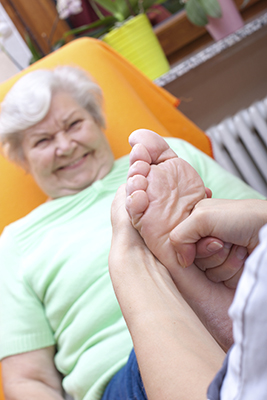 Taking preventative measures as a diabetic patient during the cold weather months is vital toward ensuring your general health. Feet are especially prone to infections and complications during colder weather due to poor blood circulation. The American College of Foot and Ankle Surgeons recommends the following tips. Work toward always keeping your feet dry by ensuring that moisture does not collect in your feet. Change your socks as often as needed. Moisturize your feet to prevent them from itching, cracking and dryness. Avoid moisturizing in between the toes as that can encourage fungal infections. Avoid overheating your feet, especially if taking hot baths. Wear properly fitting footwear and make sure to see your doctor periodically for regular foot exams.
Taking preventative measures as a diabetic patient during the cold weather months is vital toward ensuring your general health. Feet are especially prone to infections and complications during colder weather due to poor blood circulation. The American College of Foot and Ankle Surgeons recommends the following tips. Work toward always keeping your feet dry by ensuring that moisture does not collect in your feet. Change your socks as often as needed. Moisturize your feet to prevent them from itching, cracking and dryness. Avoid moisturizing in between the toes as that can encourage fungal infections. Avoid overheating your feet, especially if taking hot baths. Wear properly fitting footwear and make sure to see your doctor periodically for regular foot exams.
Diabetic foot care is important in preventing foot ailments such as ulcers. If you are suffering from diabetes or have any other concerns about your feet, contact Dr. Joshua David Scoll of Pennsylvania. Our doctor can provide the care you need to keep you pain-free and on your feet.
Diabetic Foot Care
Diabetes affects millions of people every year. Diabetes can damage blood vessels in many parts of the body, including the feet. Because of this, taking care of your feet is essential if you have diabetes, and having a podiatrist help monitor your foot health is highly recommended.
The Importance of Caring for Your Feet
- Routinely inspect your feet for bruises or sores.
- Wear socks that fit your feet comfortably.
- Wear comfortable shoes that provide adequate support.
Patients with diabetes should have their doctor monitor their blood levels because blood sugar levels play such a huge role in diabetic care. Monitoring these levels on a regular basis is highly advised.
It is always best to inform your healthcare professional of any concerns you may have regarding your feet, especially for diabetic patients. Early treatment and routine foot examinations are keys to maintaining proper health, especially because severe complications can arise if proper treatment is not applied.
If you have any questions please feel free to contact our offices located in Philadelphia and Bensalem, PA. We offer the newest diagnostic and treatment technologies for all your foot and ankle needs.
Custom Orthotics Better than Over-the-Counter Inserts
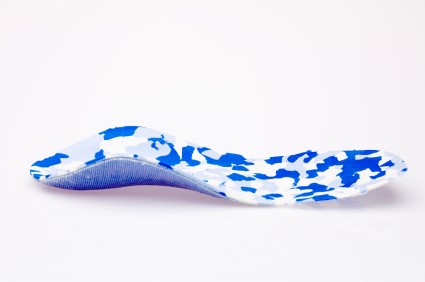 Orthotics are different from shoe inserts in that they are designed specifically for your feet, meant to treat you specific foot condition. At least “58 percent of Americans have said they have had heel pain due to ill-fitting shoes,” according to the American Podiatric Medical Association, and many resort to using over-the-counter shoe inserts to aid in fighting foot pain. However, even though shoe inserts can offer comfort and support, they are not customized to address the individual’s specific foot problems. Orthotics are crafted from an individual’s foot imprints and can be used to treat a multitude of problems including plantar fasciitis, heel spurs, tendon problems, arthritis, flat feet and more.
Orthotics are different from shoe inserts in that they are designed specifically for your feet, meant to treat you specific foot condition. At least “58 percent of Americans have said they have had heel pain due to ill-fitting shoes,” according to the American Podiatric Medical Association, and many resort to using over-the-counter shoe inserts to aid in fighting foot pain. However, even though shoe inserts can offer comfort and support, they are not customized to address the individual’s specific foot problems. Orthotics are crafted from an individual’s foot imprints and can be used to treat a multitude of problems including plantar fasciitis, heel spurs, tendon problems, arthritis, flat feet and more.
If you are having discomfort in your feet and would like to try orthotics, contact Dr. Joshua David Scoll of Pennsylvania. Our doctor can provide the care you need to keep you pain-free and on your feet.
What are Orthotics?
Orthotics are inserts you can place into your shoes to help with a variety of foot problems such as flat feet or foot pain. Orthotics provide relief and comfort for minor foot and heel pain, but can’t correct serious biomechanical problems in your feet.
Over-the-Counter Inserts
Orthotics come in a wide variety of over-the-counter inserts that are used to treat foot pain, heel pain, and minor problems. For example, arch supports can be inserted into your shoes to help correct over arched or flat feet, while gel insoles are often used because they provide comfort and relief from foot and heel pain by alleviating pressure.
Prescription Orthotics
If over-the-counter inserts don’t work for you, or if you have a more severe foot issue, it is possible to have your podiatrist prescribe custom orthotics. These high quality inserts are designed to treat problems such as abnormal motion, plantar fasciitis, and more severe heel pain. They can even be used to help patients suffering from diabetes by treating foot ulcers and painful calluses, and are usually molded to your feet individually, which allows them to provide full support and comfort.
If you are experiencing minor to severe foot or heel pain, it’s recommended to speak with your podiatrist on the possibilities of using orthotics. A podiatrist can determine which type of orthotic is right for you and allow you to take the first steps towards being pain free.
If you have any questions please feel free to contact our offices located in Philadelphia and Bensalem, PA. We offer the newest diagnostic and treatment technologies for all your foot and ankle needs.
How to Shop for Shoes
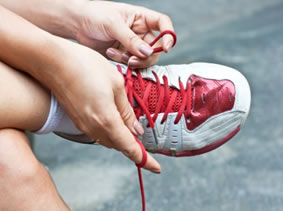 For individuals who are looking for properly-fitting and comfortable shoes such as dress shoes or boots, look for those that offer adequate arch support as well as enough room in the toe box of the shoes for our toes to wiggle, according to Dr. Bob Weil, sports podiatrist. Heels of shoes should also be no higher than an inch and a half. Also take into consideration the length and width of our feet, especially when getting them measured. Shoes should offer good support, mostly for the arch area.
For individuals who are looking for properly-fitting and comfortable shoes such as dress shoes or boots, look for those that offer adequate arch support as well as enough room in the toe box of the shoes for our toes to wiggle, according to Dr. Bob Weil, sports podiatrist. Heels of shoes should also be no higher than an inch and a half. Also take into consideration the length and width of our feet, especially when getting them measured. Shoes should offer good support, mostly for the arch area.
Finding a properly-fitting shoe is important in reducing injuries and preventing foot problems. For more information about treatment, contact Dr. Joshua David Scoll of Pennsylvania. Our doctor can provide the care you need to keep your pain free and on your feet.
Proper Shoe Fitting
A common concern when it comes to foot health, having properly fitted shoes can help prevent injuries to the foot. Out feet affect our posture and gait, which in turn affects the biomechanics and overall bodily structure. With 33 joints, 26 bones, and over 100 ligaments, the potential for serious injury is much greater than one realizes. Although the feet cease growth in adulthood, they still change shape as they mature. Here are some factors to consider when it comes to investing in proper fitting shoes:
- Be sure the shoes fit correctly right away
- Ensure the ball of your foot fits comfortably in the widest portion of the shoes
- Even though they may look fashionable, improper fitting shoes can either create adverse conditions or exacerbate existing ones you may already have
- Walk along a carpeted surface to ensure the shoes comfortably fit during normal activity
Keeping in mind how shoes fit the biomechanics of your body, properly-fitting shoes are vitally important. Fortunately, it is not difficult to acquire footwear that fits correctly. Be sure to wear shoes that support the overall structure of your body. Do your feet a favor and invest in several pairs of well-fitted shoes today.
If you have any questions please feel free to contact our office located in Philadelphia and Bensalem, PA. We offer the newest diagnostic tools and technology to treat your foot and ankle needs.
How to Get Rid of Athlete’s Foot
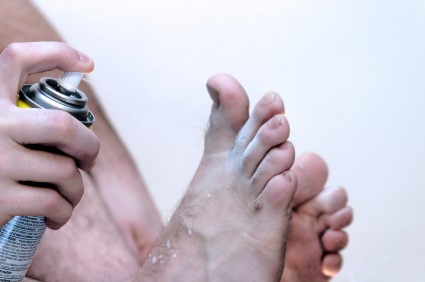 Odor emanates from people’s feet due to sweat or a lack of good hygiene practices. Bacteria can form as a result of either of these two reasons, and it may produce a strong odor. They tend to form around areas that are moist on your feet, and they feed on skin oils and dead cells. When bacteria thrive, they eliminate waste in the form of organic acids, which causes feet to smell. In order to keep your feet bacteria free, you should change your socks daily, keep your toenails clipped and clean, dry feet thoroughly after showering, and swab in between your toes with rubbing alcohol.
Odor emanates from people’s feet due to sweat or a lack of good hygiene practices. Bacteria can form as a result of either of these two reasons, and it may produce a strong odor. They tend to form around areas that are moist on your feet, and they feed on skin oils and dead cells. When bacteria thrive, they eliminate waste in the form of organic acids, which causes feet to smell. In order to keep your feet bacteria free, you should change your socks daily, keep your toenails clipped and clean, dry feet thoroughly after showering, and swab in between your toes with rubbing alcohol.
Athlete’s foot is an inconvenient condition that can be easily reduced with the proper treatment. If you have any concerns about your feet and ankles, contact Dr. Joshua David Scoll of Pennsylvania. Our doctor can provide the care you need to keep you pain-free and on your feet.
Athlete’s Foot: The Sole Story
Athlete's foot, also known as tinea pedis, can be an extremely contagious foot infection. It is commonly contracted in public changing areas and bathrooms, dormitory style living quarters, around locker rooms and public swimming pools, or anywhere your feet often come into contact with other people.
Solutions to Combat Athlete’s Foot
- Hydrate your feet by using lotion
- Exfoliate
- Buff off nails
- Use of anti-fungal products
- Examine your feet and visit your doctor if any suspicious blisters or cuts develop
Athlete’s foot can cause many irritating symptoms such as dry and flaking skin, itching, and redness. Some more severe symptoms can include bleeding and cracked skin, intense itching and burning and even pain when walking. In the worst cases, athlete’s foot can cause blistering as well. Speak to your podiatrist for a better understanding of the different causes of athlete’s foot, as well as helping you figure out which treatment options are best for you.
If you have any questions please feel free to contact our office located in Philadelphia and Bensalem, PA. We offer the newest diagnostic and treatment technologies for all your foot and ankle needs.
Shoes with “Little Heel-to-Toe Drop” May Reduce Injury Risk
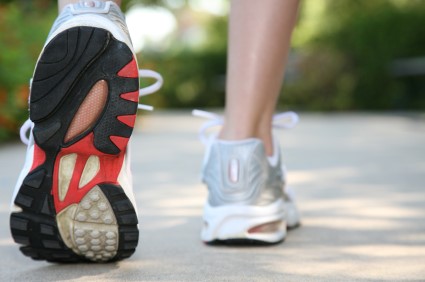 Shoes are important in determining the comfort of your feet, but they are also important in mitigating the risk of injury. According to those who run with minimalist shoes, it is suggested that shoes with low or no heel-to-toe drop can help lead to a reduced risk of injury. This shoe concept allows the feet to run and distribute impact force and weight more evenly. Shoes with higher heels can lead to your body being tilted out of alignment. Lower shoe drops can also help with relief for injuries or conditions such as Morton’s neuroma or arthritic joint pain.
Shoes are important in determining the comfort of your feet, but they are also important in mitigating the risk of injury. According to those who run with minimalist shoes, it is suggested that shoes with low or no heel-to-toe drop can help lead to a reduced risk of injury. This shoe concept allows the feet to run and distribute impact force and weight more evenly. Shoes with higher heels can lead to your body being tilted out of alignment. Lower shoe drops can also help with relief for injuries or conditions such as Morton’s neuroma or arthritic joint pain.
Runners can still be prone to running injuries even with proper precautions. If you are suffering from a running injury, contact Dr. Joshua David Scoll of Pennsylvania. Our doctor can provide the care you need to keep you pain-free and on your feet.
How to Prevent Running Injuries
Many common running injuries are caused by overuse and overtraining. When the back of the kneecap starts wearing out and starts causing pain in your knee, this is commonly referred to as runner’s knee. Runner’s knee is a decrease in strength in your quadriceps and can occur if you’re not wearing properly fitted or supporting shoes. To prevent runner’s knee, focusing on hip strengthening is a good idea, as well as strengthening your quads to keep the kneecaps aligned.
What Are Some Causes of Running Injuries?
- One cause of a common running injury is called iliotibial band syndrome.
- Plantar fasciitis is also another common injury.
- Stress fractures can occur from overtraining, lack of calcium, or even your running style.
Best Ways to Prevent Running Injuries
- Wear footwear that fits properly and suits your running needs.
- Running shoes are the only protective gear that runners have to safeguard them from injury.
- Make a training schedule. Adding strengthening exercises as well as regular stretching can help keep you strong and limber and can lessen the possibility of injuries.
- Stretching keeps muscles limber, this will help you gain better flexibility.
If you have any questions please feel free to contact our offices located in Philadelphia and Bensalem, PA. We offer the newest diagnostic tools and technology to treat your foot and ankle needs.
Foot Misalignment May Interfere with Spinal Function
 If leg or foot misalignment exists, it may interfere with spinal function. Feet are described as “the foundation of the body.” At birth, most people tend to have perfect feet. By age 20, 80 percent of those with “perfect feet” have developed some type of foot problem, and by the age of 40, nearly everyone has some sort of foot condition. The use of external supports such as heel lifts may significantly reduce biomechanical forces on the lumbar spine. The use of these lifts has been found to help ease structural strains on the body. Be sure to see your podiatrist if you suspect your feet are misaligned.
If leg or foot misalignment exists, it may interfere with spinal function. Feet are described as “the foundation of the body.” At birth, most people tend to have perfect feet. By age 20, 80 percent of those with “perfect feet” have developed some type of foot problem, and by the age of 40, nearly everyone has some sort of foot condition. The use of external supports such as heel lifts may significantly reduce biomechanical forces on the lumbar spine. The use of these lifts has been found to help ease structural strains on the body. Be sure to see your podiatrist if you suspect your feet are misaligned.
If you have any concerns about your feet, contact Dr. Joshua David Scoll of Pennsylvania. Our doctor can provide the care you need to keep you pain-free and on your feet.
Biomechanics in Podiatry
Podiatric biomechanics is a particular sector of specialty podiatry with licensed practitioners who are trained to diagnose and treat conditions affecting the foot, ankle and lower leg. Biomechanics deals with the forces that act against the body, causing an interference with the biological structures. It focuses on the movement of the ankle, the foot and the forces that interact with them.
A History of Biomechanics
- Biomechanics dates back to the BC era in Egypt where evidence of professional foot care has been recorded.
- In 1974 biomechanics gained a higher profile from the studies of Merton Root, who claimed that by changing or controlling the forces between the ankle and the foot, corrections or conditions could be implemented to gain strength and coordination to the area.
Modern technological improvements are based on past theories and therapeutic processes that provide a better understanding of podiatric concepts for biomechanics. Computers can provide accurate information about the forces and patterns of the feet and lower legs.
Understanding biomechanics of the feet can help improve and eliminate pain, stopping further stress to the foot.
If you have any questions please feel free to contact our offices located in Philadelphia and Bensalem, PA. We offer the newest diagnostic and treatment technologies for all your foot and ankle needs.
Exercise and Foot Care
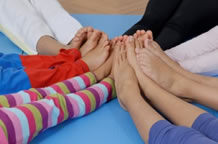 Playing sports can cause many different types of injuries as a result of a wrong movement. Twisted ankles, torn tendons, bruised knees and falls can all cause chronic discomfort and loss of mobility if left untreated. The most common injuries are ACL injuries in female soccer players, ankle sprains in basketball players and arm injuries for baseball and softball players. The most common way to treat sports injuries is the RICE method. RICE stands for Rest, Ice, Compression, and Elevation. This method is used to reduce swelling and expedite the healing process for an injury. In order to prevent sports injuries, you should make sure you are wearing the right shoes for the activity you are doing. You should also stretch prior to exercising in order to increase flexibility. “Cooling down” after exercising will also help prevent injury because it returns muscles back to their optimal length.
Playing sports can cause many different types of injuries as a result of a wrong movement. Twisted ankles, torn tendons, bruised knees and falls can all cause chronic discomfort and loss of mobility if left untreated. The most common injuries are ACL injuries in female soccer players, ankle sprains in basketball players and arm injuries for baseball and softball players. The most common way to treat sports injuries is the RICE method. RICE stands for Rest, Ice, Compression, and Elevation. This method is used to reduce swelling and expedite the healing process for an injury. In order to prevent sports injuries, you should make sure you are wearing the right shoes for the activity you are doing. You should also stretch prior to exercising in order to increase flexibility. “Cooling down” after exercising will also help prevent injury because it returns muscles back to their optimal length.
Every day foot care is very important to prevent infection and other foot ailments. If you need your feet checked contact Dr. Joshua David Scoll of Pennsylvania. Our doctor can provide the care you need to keep you pain-free and on your feet.
Every Day Foot Care
Often, people take care of their bodies, face and hair more so than they do for their feet. But the feet are a very important aspect of our bodies, and one that we should pay more attention to. After all, without our feet, we would not be able to perform most daily tasks. It is best to check your feet regularly to make sure there are no new bruises or cuts that you may not have noticed before, for example.
For dry feet, moisturizer can easily be a remedy and can be applied as often as necessary to the affected areas. Wearing shoes that fit well can also help you maintain good foot health, as well as making it easier to walk and do daily activities without the stress or pain of ill-fitting shoes, high heels, or even flip flops.
Also, wearing clean socks with closed shoes is important to ensure that sweat and bacteria do not accumulate within the shoe. Clean socks help to prevent athlete’s foot, fungi problems, bad odors, and can absorb sweat.
If you have any questions please feel free to contact one of our offices located in Philadelphia and Bensalem, PA. We offer the newest diagnostic and treatment technologies for all your foot and ankle needs.
Surgery expected for Ben Simmons
 Ben Simmons of the Philadelphia 76ers is expected to undergo surgery on his broken foot. He is expected to be out for three months, which would push his NBA debut into 2017. Simmons fractured his fifth metatarsal in his right foot during a team practice. There has been speculation that the injury may be a result of Simmons’ recent weight gain, since he gained over 30 pounds of muscle during the summer.
Ben Simmons of the Philadelphia 76ers is expected to undergo surgery on his broken foot. He is expected to be out for three months, which would push his NBA debut into 2017. Simmons fractured his fifth metatarsal in his right foot during a team practice. There has been speculation that the injury may be a result of Simmons’ recent weight gain, since he gained over 30 pounds of muscle during the summer.
Foot surgery is sometimes necessary to fix a foot ailment. To learn more, contact Dr. Joshua David Scoll of Pennsylvania. Our doctor can provide the care you need to keep you pain free and on your feet.
When Is Surgery Necessary?
Foot and ankle surgery is generally reserved for cases in which less invasive, conservative procedures have failed to help with the problem. Some of the cases in which surgery may be necessary are:
- Removing foot deformities like bone spurs and bunions
- Severe arthritis that has caused bone issues
- Cosmetic reconstruction
What Types of Surgery Are There?
The type of surgery you receive will depend on the nature of the problem you have. Some of the possible surgeries include:
- Bunionectomy for painful bunions
- Surgical fusion for realignment of bones
- Neuropathy decompression surgery to treat nerve damage
Benefits of Surgery
Although surgery is usually a last resort, it can provide more complete pain relief compared to non-surgical methods and may allow you to finally resume full activity.
Surgical techniques have also become increasingly sophisticated. Techniques like endoscopic surgery allow for smaller incisions and faster recovery times.
If you have any questions please contact our offices located in Philadelphia and Bensalem, PA. We offer the newest diagnostic and treatment technologies for all your foot and ankle needs.
Ben Simmons Discovers Stress Fracture Following Tests
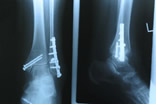 After Ben Simmons received an X-ray and MRI on his foot and ankle, it was revealed that he had suffered a broken foot. The severity of his injury has not yet been released, and it is unknown whether he will need to be treated via boot or surgery.The timetable for Simmons’s recovery is currently at 6-10 weeks, however that could change based on how he is treated. The injury is expected to be minor with little to no complications for the future.
After Ben Simmons received an X-ray and MRI on his foot and ankle, it was revealed that he had suffered a broken foot. The severity of his injury has not yet been released, and it is unknown whether he will need to be treated via boot or surgery.The timetable for Simmons’s recovery is currently at 6-10 weeks, however that could change based on how he is treated. The injury is expected to be minor with little to no complications for the future.
Activities where too much pressure is put on the feet can cause stress fractures. To learn more, contact Dr. Joshua David Scoll of Pennsylvania. Our doctor will treat your foot and ankle needs.
Dealing with Stress Fractures of the Foot and Ankle
The Stress Fractures occur on the foot and ankle when muscles in these areas weaken from too much or too little use. Then the feet and ankles lose support when walking or running from the impact of the ground. Since there is no protection the bones receive the full impact of each step. The stress on the feet causes cracks to form in the bones, thus called stress fractures.
What are Stress Fractures?
Stress fractures occur frequently in individuals whose daily activities cause great impact on the feet and ankles. Stress factors are most common among:
-runners
-people affected with Osteoporosis
-play tennis or basketball
-gymnastics
-high impact workouts
Symptoms
Pain from the fractures occur in the area of the fractures, and can be constant or intermittent. It will often cause sharp or dull pain with swelling and tenderness. Engaging in any kind of activity which involves in high impact will aggravate pain.
If you have any questions, please feel free to contact our office in Philadelphia and Bensalem, PA. We offer the newest diagnostic and treatment technologies for all your foot care needs.
How to Stop Hyperhidrosis
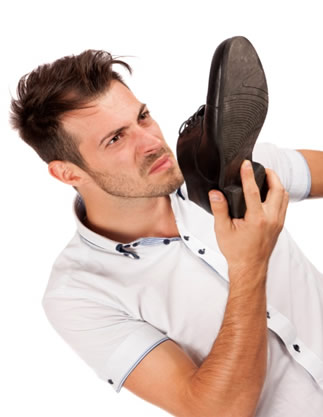 Hyperhidrosis is a medical condition that causes excessive sweating, even if the body doesn’t need to be cooled off. This condition can occur on the scalp, forehead, underarms, hands, or feet. Symptoms of hyperhidrosis is visible sweating that interferes with everyday activities, and which can lead to fungal infections such as athlete’s foot. Although most cases of the condition are genetic, it can also be caused by medical conditions such as diabetes and gout.
Hyperhidrosis is a medical condition that causes excessive sweating, even if the body doesn’t need to be cooled off. This condition can occur on the scalp, forehead, underarms, hands, or feet. Symptoms of hyperhidrosis is visible sweating that interferes with everyday activities, and which can lead to fungal infections such as athlete’s foot. Although most cases of the condition are genetic, it can also be caused by medical conditions such as diabetes and gout.
If you have any concerns about your feet or ankles, contact Dr. Joshua David Scoll of Pennsylvania. Our doctor will treat your foot and ankle needs.
Hyperhidrosis of the Feet
Hyperhidrosis is a rare disorder that can cause people to have excessive sweating of their feet. This can usually occur all on its own without rigorous activity involved. People who suffer from hyperhidrosis may also experience sweaty palms.
Although it is said that sweating is a healthy process meant to cool down the body temperature and to maintain a proper internal temperature, hyperhidrosis may prove to be a huge hindrance on a person’s everyday life.
Plantar hyperhidrosis is considered to be the main form of hyperhidrosis. Secondary hyperhidrosis can refer to sweating that occurs in areas other than the feet or hands and armpits. Often this may be a sign of it being related to another medical condition such as menopause, hyperthyroidism and even Parkinson’s disease.
In order to alleviate this condition, it is important to see your doctor so that they may prescribe the necessary medications so that you can begin to live a normal life again. If this is left untreated, it is said that it will persist throughout an individual’s life.
A last resort approach would be surgery, but it is best to speak with your doctor to find out what may be the best treatment for you.
If you have any questions, please feel free to contact our office in Philadelphia and Bensalem, PA. We offer the newest diagnostic and treatment technologies for all your foot care needs.
More...
Poorly Fitting Shoes May Aggravate Bunions
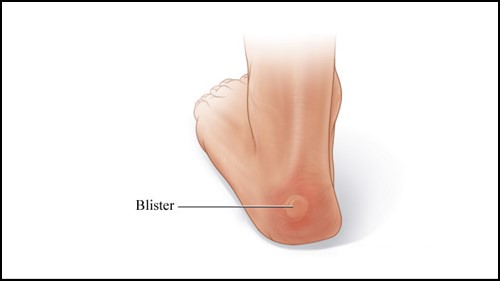 A bunion, also known as hallux valgus, can be described as a bump on the side of our big toe, indicating that our toe bone has deviated from a normal alignment. Bunions occur when our big toe begins leaning toward the second toe and are often caused by genetics. Poorly fitting shoes can also aggravate bunions, so make sure to find shoes that are comfortable and opt for width. Bunions are progressive and do not go away on their own, so it’s best to see your podiatrist to properly diagnose them.
A bunion, also known as hallux valgus, can be described as a bump on the side of our big toe, indicating that our toe bone has deviated from a normal alignment. Bunions occur when our big toe begins leaning toward the second toe and are often caused by genetics. Poorly fitting shoes can also aggravate bunions, so make sure to find shoes that are comfortable and opt for width. Bunions are progressive and do not go away on their own, so it’s best to see your podiatrist to properly diagnose them.
Untreated bunions can make walking uncomfortable. If you are suffering from bunions, contact Dr. Joshua David Scoll of Pennsylvania. Our doctor will attend to all of your foot and ankle needs and answer any of your related questions.
What is a Bunion?
A bunion is formed of swollen tissue or an enlargement of boney growth, usually located at the base joint of the toe that connects to the foot. The swelling occurs by the bones in the big toe shifting inward, which impacts the other toes of the foot. This causes the area around the base of the big toe to become inflamed and painful.
Why do Bunions Form?
- Genetics – susceptibility to bunions are often hereditary
- Stress on the feet – poorly fitted and uncomfortable footwear that places stress on feet, such as heels, can cause bunions to form
How are Bunions Diagnosed?
Doctors often perform two tests – blood tests and x-rays – when trying to diagnose bunions, especially in the early stages of development. Blood tests help determine if the foot pain is being caused by something else, such as arthritis, while x-rays provide a clear picture of your bone structure to your doctor.
How are Bunions Treated?
- Refrain from wearing heels or similar shoes that cause discomfort
- Select wider shoes that can provide more comfort and reduce pain
- Anti-inflammatory and pain management drugs
- Orthotics or foot inserts
- Surgery
If you have any questions, please feel free to contact our office located in Philadelphia and Bensalem, PA. We offer the newest diagnostic and treatment technologies for all your foot care needs.
How to Treat Ingrown Toenails
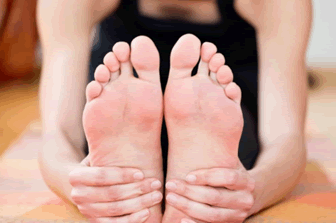 Ingrown toenails can be extremely uncomfortable for those who have them. They are caused when the edge of the toenail begins to grow downward into the skin surrounding it. Ingrown toenails are most commonly found in teenagers and the elderly. The reason why they are usually found in teens is because of sweat. Sweat causes the skin to swell and become and moist, which causes it to split. This allows for an ingrown toenail to occur. They are also common in the elderly because their nails are thick and hard. The thickness and hardness of their nails makes them harder to cut and causes pressure on the surrounding skin.
Ingrown toenails can be extremely uncomfortable for those who have them. They are caused when the edge of the toenail begins to grow downward into the skin surrounding it. Ingrown toenails are most commonly found in teenagers and the elderly. The reason why they are usually found in teens is because of sweat. Sweat causes the skin to swell and become and moist, which causes it to split. This allows for an ingrown toenail to occur. They are also common in the elderly because their nails are thick and hard. The thickness and hardness of their nails makes them harder to cut and causes pressure on the surrounding skin.
Ingrown toenails can become painful if they are not treated properly. For more information about ingrown toenails, contact Dr. Joshua David Scoll of Pennsylvania. Our doctor will answer any of your foot- and ankle-related questions.
Ingrown Toenails
Ingrown toenails occur when a toenail grows sideways into the bed of the nail, causing pain, swelling, and possibly infection.
Causes
- Bacterial infections
- Improper nail cutting such as cutting it too short or not straight across
- Trauma to the toe, such as stubbing, which causes the nail to grow back irregularly
- Ill-fitting shoes that bunch the toes too close together
- Genetic predisposition
Prevention
Because ingrown toenails are not something found outside of shoe-wearing cultures, going barefoot as often as possible will decrease the likeliness of developing ingrown toenails. Wearing proper fitting shoes and using proper cutting techniques will also help decrease your risk of developing ingrown toenails.
Treatment
Ingrown toenails are a very treatable foot condition. In minor cases, soaking the affected area in salt or antibacterial soaps will not only help with the ingrown nail itself, but also help prevent any infections from occurring. In more severe cases, surgery is an option. In either case, speaking to your podiatrist about this condition will help you get a better understanding of specific treatment options that are right for you.
If you have any questions please feel free to contact one of our offices located in Philadelphia and Bensalem, PA. We offer the newest diagnostic and treatment technologies for all your foot and ankle needs.
Amari Cooper Suffered from Foot Injury
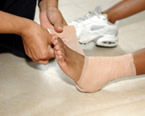 Amari Cooper was suffering from a foot injury when he became “the first rookie in Oakland Raiders history to reach 1,000 receiving yards.” Cooper played throughout most of the 2015 season with plantar fasciitis, a condition that caused him foot pain. However, Cooper was confident in his ability to play. “[I]t really affected my game, but I was mentally tough and I fought through it,” he said.
Amari Cooper was suffering from a foot injury when he became “the first rookie in Oakland Raiders history to reach 1,000 receiving yards.” Cooper played throughout most of the 2015 season with plantar fasciitis, a condition that caused him foot pain. However, Cooper was confident in his ability to play. “[I]t really affected my game, but I was mentally tough and I fought through it,” he said.
Sports related foot and ankle injuries need proper treatment before players can go back to their regular routines. For more information, contact Dr. Joshua David Scoll of Pennsylvania. Our doctor can provide the care you need to keep your pain free and on your feet.
Sport Related Foot and Ankle Injuries
Foot and ankle injuries are a common occurrence when it comes to athletes of any sport. While many athletes dismiss the initial aches and pains, the truth is that ignoring potential foot and ankle injuries can lead to serious problems. As athletes continue to place pressure and strain the area further, a mild injury can turn into something as serious as a rupture and may lead to a permanent disability. There are many factors that contribute to sports related foot and ankle injuries, which include failure to warm up properly, not providing support or wearing bad footwear. Common injuries and conditions athletes face, including:
- Plantar Fasciitis
- Plantar Fasciosis
- Achilles Tendinitis
- Achilles Tendon Rupture
- Ankle Sprains
Sports-related injuries are commonly treated using the RICE method. This includes rest, applying ice to the injured area, compression and elevating the ankle. More serious sprains and injuries may require surgery, which could include arthroscopic and reconstructive surgery. Rehabilitation and therapy may also be required in order to get any recovering athlete to become fully functional again. Any unusual aches and pains an athlete sustains must be evaluated by a licensed, reputable medical professional.
If you have any questions please feel free to contact one of our offices located in Philadelphia and Bensalem, PA. We offer the newest diagnostic and treatment technologies for all your foot and ankle needs.
All About Rheumatoid Arthritis
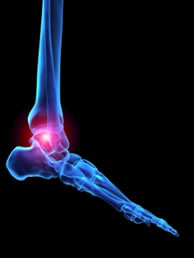 Rheumatoid arthritis occurs when the immune system causes inflammation in the knees, wrists, elbows, and other joints. Arthritis usually affects those between the ages of 40 and 70, and there unfortunately is no cure for it. People who suffer from arthritis might have a new treatment option as early as next spring. The treatment is a drug called Sarilumab, and it works to stop flare-ups in the joints.
Rheumatoid arthritis occurs when the immune system causes inflammation in the knees, wrists, elbows, and other joints. Arthritis usually affects those between the ages of 40 and 70, and there unfortunately is no cure for it. People who suffer from arthritis might have a new treatment option as early as next spring. The treatment is a drug called Sarilumab, and it works to stop flare-ups in the joints.
Because RA affects more than just your joints, including the joints in your feet and ankles, it is important to seek early diagnosis from your podiatrist if you feel like the pain in your feet might be caused by RA. For more information, contact Dr. Joshua David Scoll of Pennsylvania. Our doctor can provide the care you need to keep your pain free and on your feet.
What Is Rheumatoid Arthritis?
Rheumatoid Arthritis (RA) is an autoimmune disorder in which the body’s own immune system attacks the membranes surrounding the joints. Inflammation of the lining and eventually the destruction of the joint’s cartilage and bone occur, causing severe pain and immobility.
Rheumatoid Arthritis of the Feet
Although RA usually attacks multiple bones and joints throughout the entire body, almost 90 percent of cases result in pain in the foot or ankle area.
Symptoms
- Swelling & pain in the feet
- Stiffness in the feet
- Pain on the ball or sole of feet
- Joint shift and deformation
Diagnosis
Quick diagnosis of RA in the feet is important so that the podiatrist can treat the area effectively. Your doctor will ask you about your medical history, occupation, and lifestyle to determine the origin of the condition. Rheumatoid Factor tests help to determine if someone is affected by the disease.
If you have any questions, please feel free to contact our offices located in in Philadelphia and Bensalem, PA. We offer the newest diagnostic and treatment technologies for all your foot care needs.
McCown Suffers Broken Foot
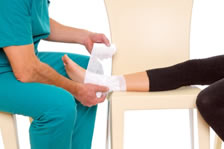 Matt McCown, junior defensive tackle for Illinois State, was sidelined for six weeks with a broken foot. McCown started 9 out of 12 games last season. ISU coach Brock Spack was hopeful that McCown would recover in time to play in the game against North Dakota state in October. “Matt is really a leader, a hard worker,” Spack said. “You hate to lose him. But the good news is we’ll get him back.”
Matt McCown, junior defensive tackle for Illinois State, was sidelined for six weeks with a broken foot. McCown started 9 out of 12 games last season. ISU coach Brock Spack was hopeful that McCown would recover in time to play in the game against North Dakota state in October. “Matt is really a leader, a hard worker,” Spack said. “You hate to lose him. But the good news is we’ll get him back.”
A broken foot requires immediate medical attention and treatment. If you need your feet checked, contact Dr. Joshua David Scoll of Pennsylvania. Our doctor can provide the care you need to keep your pain free and on your feet.
Broken Foot Causes, Symptoms, and Treatment
A broken foot is caused by one of the bones in the foot typically breaking when bended, crushed, or stretched beyond its natural capabilities. Usually the location of the fracture indicates how the break occurred, whether it was through an object, fall, or any other type of injury.
Common Symptoms of Broken Feet:
- Bruising
- Pain
- Redness
- Swelling
- Blue (foot)
- Numbness
- Cold
- Misshapen
- Cuts
- Deformities
Those that suspect they have a broken foot shoot seek urgent medical attention where a medical professional could diagnose the severity.
Treatment for broken bones varies depending on the cause, severity and location. Some will require the use of splints, casts or crutches while others could even involve surgery to repair the broken bones. Personal care includes the use of ice and keeping the foot stabilized and elevated.
If you have any questions please feel free to contact one of our offices located in Philadelphia and Bensalem, PA. We offer the newest diagnostic and treatment technologies for all your foot and ankle needs.
